The west Cumbria fishing family saved by social media
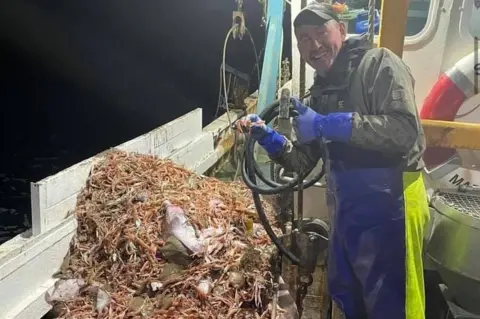 Charisma
CharismaWhen fisherman John McAvoy goes to work, he is gone for days. After two nights at sea and precious little sleep he returns to sell his catch. These days the first in line are the local customers who, following the siren call of social media, saved him and his boat when Covid threatened to sink his livelihood. As part of a series focusing on west Cumbria, BBC News has been finding out how.
The Charisma's Facebook page is no place for the peckish.
In among posts detailing the boat's return to dock and listing its latest catch are tantalising pictures of meals made with brill or skate or prawns bought from the McAvoys on the quayside in Maryport, Cumbria.
There is plaice, Dover sole, monkfish, whelks, John Dory and gurnard - a peculiar-looking fish once more common as bait than on the dining table but increasing in popularity.
There are langoustines too - also known as Dublin Bay prawns or Norway lobster - all spikes and difficult shell that no-one used to want, John McAvoy says. Now everyone does and they can fetch as much as £50 a kilo in Spain or France.
This is the odd thing about fishing in the UK. For years we have sold much of what we catch to feed other hungry Europeans. They were far more partial to our prawns than we were. In turn we have bought back from them the cod and haddock, caught in colder waters further north, that keep our fish and chips shops afloat.
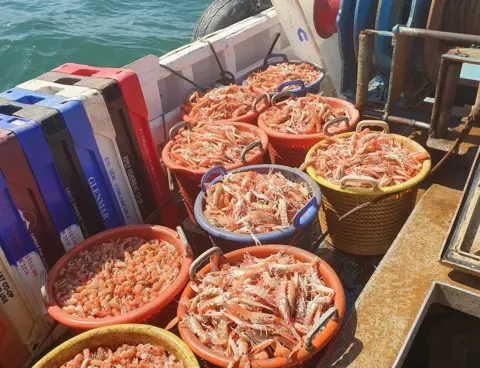 Charisma
CharismaBut Covid put paid to that odd market symmetry, halting the transport of seafood to buyers in France and Spain and shutting restaurants. Were it not for John's daughters, and their youthful affinity with social media, that might have been the end of the line for him.
"My daughter set up a Facebook page and we had that much interest that we carried on doing it [after the pandemic] as a thank you to the public for saving our bacon during Covid," says the 53-year-old.
Amy, 25, says she started with friends, encouraging people to share her posts, and now the page has several thousand members.
"It was just everybody spreading the word," she says. It was word-of-mouth in a very specific sense of the phrase, and it travelled some distance.
Graeme Elsby, from Crosby, Merseyside, does not exactly make the 140-mile trip especially, but every visit to his caravan in Lorton, about 30 minutes from Maryport, involves an outing to the quayside.
He watches the Facebook page, "getting all excited about going and getting some nice fresh fish" and is ready to set off when Amy posts that the boat is back in harbour.
For Graeme, fish is not the same in supermarkets where it "looks like it's been dead for a month". Fresh fish has eyes that sparkle and "tell a story", not the "rheumy" peer of something long past its prime, he ventures.
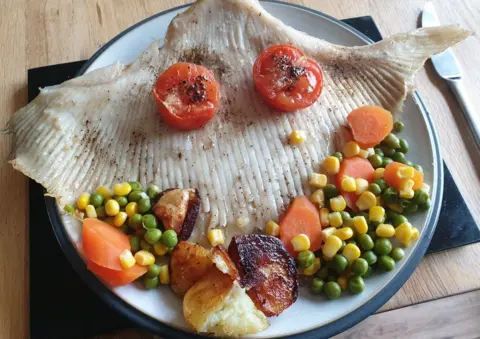 Emma Bradley
Emma BradleySelling direct to the public has its advantages on both sides.
John's income from his queuing customers is more stable than from the fickle fish market where his profit can change with the tide and prices vary according to what is plentiful or scarce.
For the customer, buying from the boat means no middlemen doubling or trebling prices.
The patiently queueing public gets first choice and whatever is not sold then goes to the markets, which are back to normal, Brexit notwithstanding. There are grumbles from John about quotas, which are supposed to have reduced for foreign boats in British waters and increased for British fishing boats, but which are still contentious in this transition period. They were "promised all sorts but nothing's materialised" and the market for live fish has faltered, he says.
But the pandemic has changed what people will buy on the quayside. They took what he had, often something they would never have chosen, or be able to afford, and now they seek it out.
"People had never tried angler fish or monkfish or John Dory," he says. "Even brill and turbot, it's like high-end restaurant fish. People have really opened up their taste buds to things like that."
Amy says they still sell direct to the public, even though they do not need to now the markets have opened up, as a thank you and because the customers keep on coming.
The Facebook page is like a community, and more people are encouraged to join it with treats like the sight of three generations of a fishing family dancing on TikTok.
"I'll do anything, me," says John. His 79-year-old dad, also called John, was more reluctant.
"We basically just did it for a laugh," Amy says. "They got a lot of likes and a lot of folk commented to say how funny they were. It makes people go on the page."
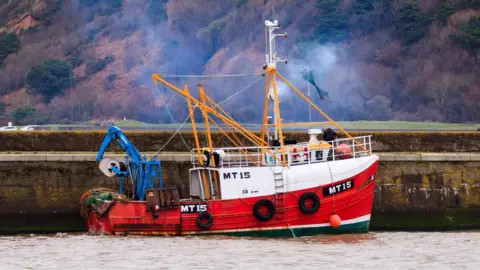 Lorraine Degraff
Lorraine DegraffJohn chooses his route by wind direction, working closer to land when the breeze is up and not sailing at all if it is more than force five. In that way fishermen have of reading the sea like it is not just a vast expanse of water, he knows from season to season where this or that fish will be found.
Twice a week he will go out, for up to 48 hours, fishing day and night. "We maybe get a couple of hours break in between hauls," he says. "You just really cat nap."
This is made worse by the dearth of crews. When there are only two of them on board the workload is hard and the sleep pattern more disrupted.
"It's a really hard job to do. Some people, they just can't hack it," he says. "In the younger generation there isn't that much interest, really."
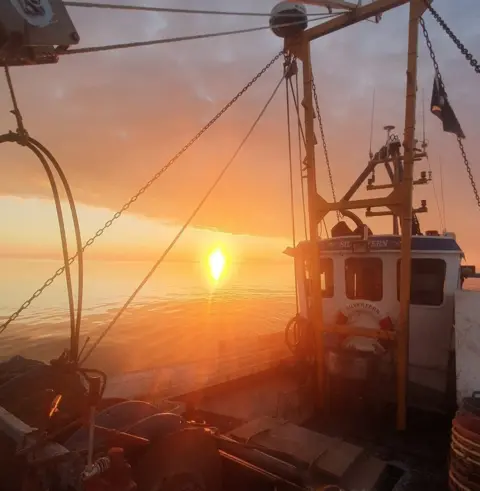 Charisma
CharismaAnother problem now is the cost of diesel: the boat consumes about £600-worth in 24 hours at sea.
"This time last year it was maybe £500-600 for a full trip, now it's like £1,200 or £1,500," John says. "We really have to think about what's coming on deck, if it's worth stopping out. You've really got to be catching [high value fish] to make ends meet." After the last two trips they only just broke even.
There are about seven or eight full time trawlers fishing out of Maryport. Four or five catching fish, and a couple of scallop boats. The town's fishing co-op, which connects them with commercial buyers, providing storage and transport, is "hanging on by a shoestring", he says.
It is run by John senior, more on a voluntary basis now he is retired. He was a joiner by trade, but loved fishing and he used redundancy money to buy his first boat.
"Any type of fishing, whether it was fishing with a rod or a net or line, it made no difference," he says. "You've got to love it. The money's a bonus."
Also a bonus was the British Empire Medal he was given in 2015 for services to local fishing industry. He turned down an invite to a Buckingham Palace garden party and went to pick up a boat instead.
"It wasn't my cup of tea, that, eating cucumber sandwiches," he says.
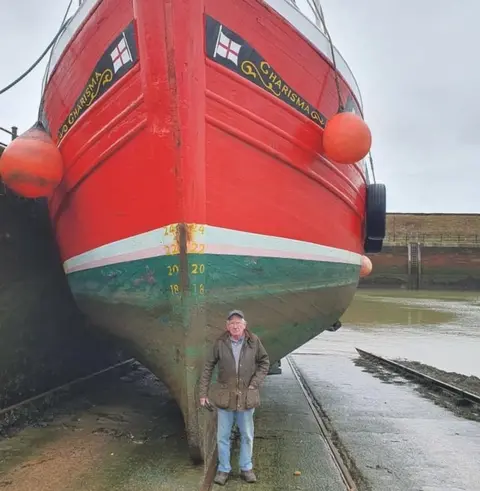 Charisma
CharismaThere is another member of the McAvoy family: John's wife Andrea. But she is not very keen on fresh fish at close quarters.
"To be fair, I don't eat much fish myself," John says.
"Working with it all the time I tend not to fetch much home. I'd rather have a pork chop."

Follow BBC North East & Cumbria on Twitter, Facebook and Instagram. Send your story ideas to [email protected].
